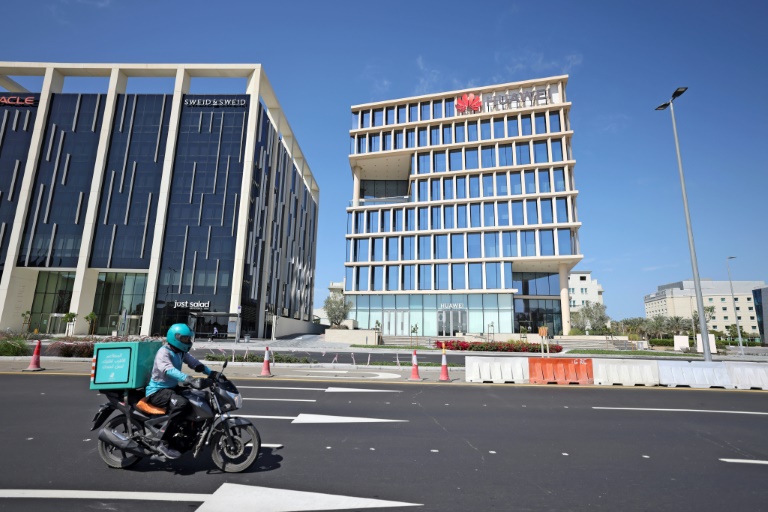‘Impossible to survive’: Dubai food delivery riders go on strike

The oil-rich United Arab Emirates is reliant on the cheap labour of millions of foreigners mostly from India, Pakistan, Nepal, Sri Lanka, the Philippines and African countries
Dubai – Food delivery drivers have staged rare strikes in Dubai, a renowned temple of luxury where fuel prices have spiralled on the back of global inflation sparked by the Ukraine war.
The riders, all of whom are foreigners mostly from south Asia, are demanding better pay and have held two strikes this month in the energy-rich Gulf state where industrial action is rare.
“It is impossible to survive in Dubai on what we make,” said a 28-year-old Pakistani driver, who spoke on condition of anonymity for fear of reprisal.
“After spending on petrol, food and accommodation, I am left with nothing at the end of a day,” said the father of two.
The driver, who said he earns around 100 dirhams ($27) to 150 dirhams a day, said “the hike in petrol prices has hit us hard”.
“We take up to 15 or 20 orders a day… But I have to shell out anything between 40 and 50 dirhams on petrol. That’s in addition to other daily expenses,” he said.
Like other drivers, he was hired to work for Talabat, part of Germany’s Delivery Hero, via a third party sponsor.
A Talabat spokesman told AFP earlier this week that drivers earn an average of 3,500 dirhams ($935) per month, depending on the number of deliveries.
“Yet, we understand economic and political realities are changing constantly, and we will always continue to listen to what riders have to say,” he added.
Dubai, one of seven emirates that make up the United Arab Emirates (UAE), ranks among the most expensive cities in the world for expatriates, with a cup of coffee costing $5.
The International Monetary Fund’s forecast in April that the war in Ukraine would spark a 3.7 percent cost of living increase in 2022 in the UAE, compared to 0.2 percent last year.
– ‘No choice’ –
The UAE is reliant on the cheap labour of millions of foreigners, mostly from India, Pakistan, Nepal, Sri Lanka, the Philippines and African countries.
Foreigners account for 90 percent of the 10-million population of the Emirates, the Arab world’s second-largest economy after neighbouring Saudi Arabia.
Riders on motorcycles are constantly navigating streets between skyscrapers and speeding down highways to deliver food to homes and offices in the wealthy city known for its ultra-consumerist lifestyle.
UAE officials did not immediately respond to AFP’s request for comment on the strikes.
In a global market barely recovering from the coronavirus pandemic, the Pakistani driver said he “had no choice but to join Talabat”.
“My family (in Pakistan) depends on me,” he said, explaining that after spending money on petrol and his daily needs, like internet fees, he has little money left at the end of each month to send home.
Talabat said it gives drivers 7.5 dirhams per delivery (around $2), but riders are demanding a two-dirham increase.
The latest protest which began on Monday was the second this month, after drivers for Deliveroo, another popular food delivery app, went on strike at the start of May after company plans to increase their working hours and cut their pay.
Deliveroo was quick to react, saying it had “paused all changes”, stressing that its initial intention had been “to propose a more well-rounded earnings structure”.
– ‘Lives on the line’ –
Advocacy group Migrant Rights said the gig economy is globally exploitative but “even worse” in Arab Gulf countries where many recruiters under the “kafala” sponsorship system do not meet “their obligations by law”.
“The protests in the UAE, which were staged at a great risk, reveal the growing frustration amongst those working in this sector,” it added.
Another delivery driver for Talabat told AFP that he was determined to pursue the strike until riders’ demands are met.
“This is for our collective benefit,” said the 19-year-old man, who also declined to be named for security reasons.
“It is impossible for us to continue in the current commission of 7.5 dirhams per delivery. The petrol alone costs me anything between 800 to 950 dirhams a month,” he said.
The cost of living increase meant that his monthly revenue has shrunk by around $260, he said, adding that now he can only send his family back home $100 instead of five times that amount before.
In addition, drivers, he said, “put our lives on the line every day by riding the bike on busy roads 24/7”.
“We do not even have health insurance in case of an accident. All we can count on is our commission,” he added.
